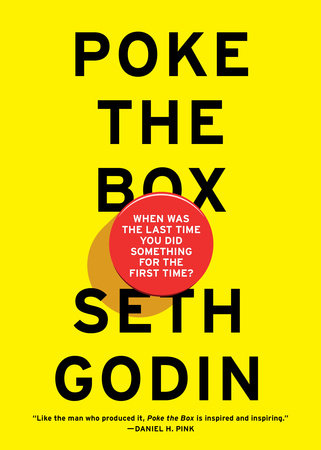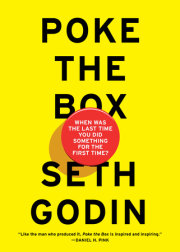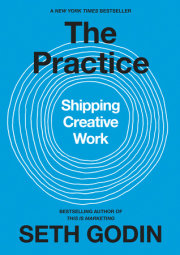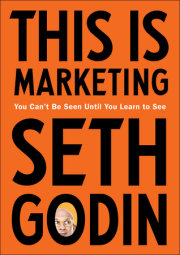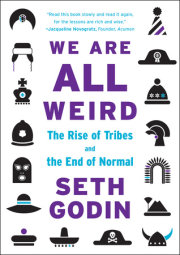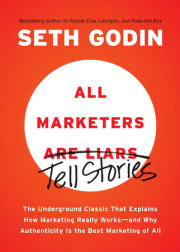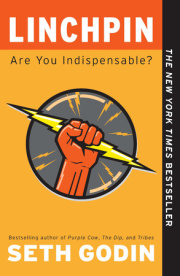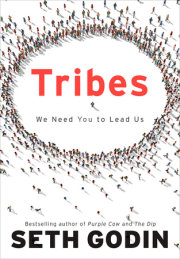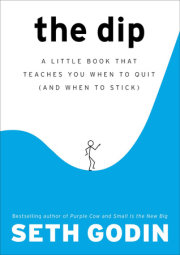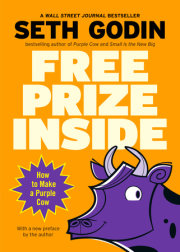Also by Seth Godin
Title Page
Copyright
Epigraph
Poke the Box
Acknowledgments
The Initiator
Annie Downs works at the Mocha Club, a nonprofit based in Nashville that raises money for the developing world by working with touring musicians.
Last year, she called her boss and said something she had never said before. “I’ve got an idea, and I’m going to start working on it tomorrow. It won’t take a lot of time and it won’t cost a lot of money, and I think it’s going to work.”
With those two sentences, Annie changed her life. And she changed her organization and the people it serves.
You’re probably wondering what her idea was. You might even be curious about how she pulled it off.
That is the wrong question.
The change was in her posture. The change was that for the first time in this job, Annie wasn’t waiting for instructions, working through a to-do list, or reacting to incoming tasks. She wasn’t handed initiative, she took it.
Annie crossed a bridge that day. She became someone who starts something, someone who initiates, someone who is prepared to fail along the way if it helps her make a difference.
Your Turn
Imagine that the world had no middlemen, no publishers, no bosses, no HR folks, no one telling you what you couldn’t do.
If you lived in that world, what would you do?
Go. Do that.
***
In China, there’s a factory that can make the same widgets your company makes—for a tenth of the price.
Down the street, there’s a restaurant busy stealing your menu and your wine list, but charging 20 percent less than you can charge.
The last travel agent has left the room. Magazine publishers gave up all their growth to bloggers. Wikipedia didn’t have to grab the reins of authority from the Encyclopaedia Britannica; contributors just showed up and did the work. Britannica staffers sat and watched.
The intermediaries and agenda setters and investors are less important than they have ever been before. In 2012, sixty-seven Web start-ups in San Francisco and New York were funded for what it often costs Silicon Valley to fund just twenty companies. There’s more money chasing more companies that need less money than ever before.
So, if money and access and organizational might aren’t the foundation of the connected economy, what is?
Initiative.
This Is a Manifesto About Starting
Starting a project, making a ruckus, taking what feels like a risk.
Not just “I’m starting to think about it,” or “We’re going to meet on this,” or even “I filed a patent application. . . .”
No, starting.
Going beyond the point of no return.
Leaping.
Committing.
Making something happen.
The Seventh Imperative
• The first imperative is to be aware—aware of the market, of opportunities, of who you are.
• The second imperative is to be educated, so you can understand what’s around you.
• The third imperative is to be connected, so you can be trusted as you engage.
• The fourth imperative is to be consistent, so the system knows what to expect.
• The fifth imperative is to build an asset, so you have something to sell.
• The sixth imperative is to be productive, so you can be well priced.
But you can do all of these things and still fail. A job is not enough. A factory is not enough. A trade is not enough. It used to be, but no longer.
The world is changing too fast. Without the spark of initiative, you have no choice but to simply react to the world. Without the ability to instigate and experiment, you are stuck, adrift, waiting to be shoved.
I can find a thousand books and a million memos about the first six imperatives. They were drilled into you in countless moments in school, and plenty of graduate schools and bosses are delighted to help you with them. But when it comes to the seventh imperative, it seems as though you’re on your own.
The seventh imperative is frightening and thus easy to overlook or ignore. The seventh imperative is to have the guts and the heart and the passion to ship.
The Difference of Go
The simple thing that separates successful individuals from those who languish is the very thing that separates exciting and growing organizations from those that stagnate and die.
The winners have turned initiative into a passion and a practice. Go ahead, make a list. Make a list of the people and organizations you admire. My guess is the seventh imperative is what sets them apart.
The challenge, it turns out, isn’t in perfecting your ability to know when to start and when to stand by. The challenge is getting into the habit of starting.
Craig Venter and Dr. Frankenstein
The man who sequenced the human genome has figured out how to use a computer to completely design the genetic code of an organism. He and his team can mess with the genes almost as easily as you can edit an essay in Word.
And yet.
And yet once the strand of code is generated and turned into organic matter in a petri dish, it just lies there. It’s not alive.
The motive force—the spark that brings it to life—is missing. Venter still needs to insert some organic tissue, something living, something alive, to transform the project into more than an inert mass of genes.
Surprisingly, that’s precisely your opportunity.
Not to buy a petri dish and a bunch of organic materials. No, the opportunity is bigger than that—it’s to see that all around you are platforms, opportunities, and entire organizations that will come to life once you are driven enough and brave enough to contribute the initiative they are missing.
The Buzzer Box
When my cousin was born, my uncle (who has a Ph.D. from MIT) built a buzzer box. It was a heavy metal contraption, with a thick black cord that plugged into the wall. It looked like something from a nuclear power plant, not a kid’s toy, but that didn’t dissuade him from tossing it into the crib.
The box had two switches, some lights, and a few other controls on it. Flip one switch and a light goes on. Flip both switches and a buzzer sounds. All terrifying, of course, unless you are a kid.
A kid sees the buzzer box and starts poking it. If I do this, that happens!
Mathematicians call this a function. Put in one variable, get a result. Call and response.
Life is a buzzer box. Poke it.
The Elements of Production
Here’s what’s needed to make something happen:
• an idea
• people to work on it
• a place to build or organize it
• raw materials
• distribution
• money
• marketing
. All rights reserved. No part of this excerpt may be reproduced or reprinted without permission in writing from the publisher.

